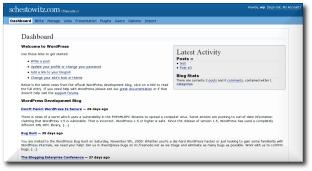Wednesday, December 21st, 2005, 4:49 pm
WordPress: Explosive Exposure & Decisions

The dashboard (back-end) is the
main enhancement offered by WordPress 2.0
 O start off, I would like to spend a couple of paragraphs to accommodate a rant. As I previously mentioned, WordPress 2.0 is intended to be out before Christmas. In reality, there are a few difficulties and many reasons to avoid premature releases. I don’t mean to spoil the enthusiasm. Yet, I truly think it would be a misjudged decision to rush the release. Patience is a true virtue here due to the arguments listed below.
O start off, I would like to spend a couple of paragraphs to accommodate a rant. As I previously mentioned, WordPress 2.0 is intended to be out before Christmas. In reality, there are a few difficulties and many reasons to avoid premature releases. I don’t mean to spoil the enthusiasm. Yet, I truly think it would be a misjudged decision to rush the release. Patience is a true virtue here due to the arguments listed below.
There are several bugs, which are sometimes fatal, e.g. browser crashes. Some time ago I raised the concern that AdBlock for Firefox has conflicts with TinyMCE, which make editing impossible to some. A release before Christmas is desirable (if not both compelling and necessary) because of massive holiday season downloads. However, why give WordPress that dreadful “buggy FOSS” reputation? Needn’t LAMP be respresented with its highest dignity? One must stick to the very same traits which earned version 1.5 nearly 1,000,000 downloads.
WordPress began to be adopted by many large companies. Many such companies run extensive public sites and intranets. Among the big names: Apple, Yahoo, MSN and About. Only yesterday it was revealed that Yahoo would liaise with WordPress for their hosting, which is exciting news indeed.
Why is that particularly exciting news? MSN and Yahoo are search giants, yet their range of applications extends far beyond that as time goes by. They handle the task of information management and thus must (or are expected to) provide rich content. And yet, Google is the largest among the three and much like the others it boasts a huge community of bloggers. Google started with search and moved on to Web-based applications, tools pertaining to information and data mining. Yahoo grew from communities, content, tools, and services. MSN grew from an operating system and a browser that points to MSN by default. All taken into account, WordPress can receive a great deal in return (not monetarily of course).
One wonders: where is Google in all of this WordPress hype? Their official blog is very poor in terms of functionality and presentation. Their main ‘courier’ or ‘messenger’ , Matt Cutts 1, has been on WordPress for months despite Blogger and Blogspot being available. The Code Manger, Chris DiBona, on the contrary, uses Google’s services rather than his old personal domain. So while Google’s Code Manager, among many others, have settled on Blogspot or Blogger, Matt Cutts refused to do so (or put more politely, preferred to abstain) and registered his own domain (running WordPress of course) where he became a sort of a messager — an oracle — of Google search algorithms. The community that is thirsty for SEO tips syndicates his blog using feeds, of which there are plenty. He is used to writing plenty of items about gadgets, film reviews and the like, but due to the versatility of WordPress feeds, his subscribers are able to set aside the ‘noise’ and get Google inside infomation exclusively. The important fact is that Matt Cutts’ blog is far more popular than these “get your blog among splogs in a 30 seconds procedure” spaces. Google could learn a few things from Matt (Cutts/Mullenweg) and given that they are kings of Open Source, it is surprising that it is them who have not adopted WordPress yet.
1 Cutts leaks information to SEO-savvy or curious audience of Web developers, much like googleguy in Webmaster World.






 Filed under:
Filed under: 